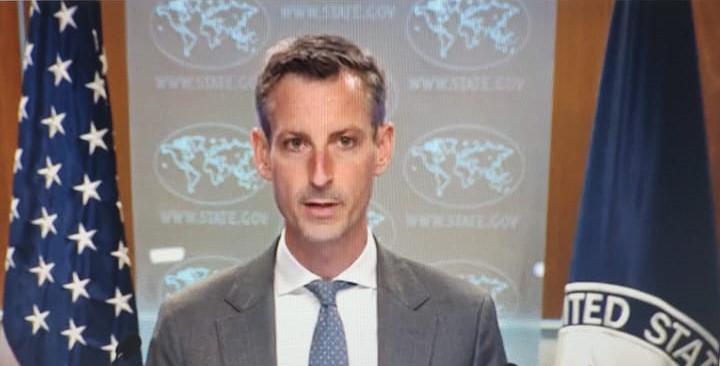US State Dept Press Briefing, Aug 22, 2022

Ned Price, Spokesperson, US State Department held a press briefing on Aug 22 afternoon.
Excerpts
MR PRICE: I do not have anything at the top. You are welcome to ask anything that comes to mind.
QUESTION: All right. Well, let’s just start with – let’s just start with Iran, because we’ve been expecting now you guys to deliver your response to the Iranians’ response to the EU. It seems to go back and forth like this. Has it been delivered yet? If not, why not? Are you waiting – there – the Israeli national security advisor is supposedly – is coming to town. We’ll be having meetings this week. Are you waiting for that meeting before delivering your response to the EU?
MR PRICE: Sure. So, to take a step back and to remind of something we’ve said since the earliest days of this: we have taken a deliberate, we have taken a principled approach to these negotiations from the start. We have said, since we had first started down this road in the Spring of last year, that if Iran is prepared to fully implement its commitments under the 2015 deal, then we are prepared to do the same. That, of course, remains as true today as it was last year.
This negotiation, it is true – and you all in this room know this – has at times languished, and it has languished at times for months and months because of the action or, oftentimes was the case, inaction from Iran. The notion that we have delayed this negotiation in any way is just not true. We stated in March when there – after the – after months of painstaking diplomacy and dialogue, we arrived at the text essentially of a deal that we were prepared for a mutual return to full implementation of the JCPOA based on that text that was on the table at the time. It was Iran, of course, that was not prepared to say the same.
The EU, as you know, did table a text more recently. That is the text that has been the topic of some discussion between the various parties over the past couple of weeks. The EU based this text on the March text that we were prepared to accept. The High Representative Mr. Borrell has described this as the final text. Iran in turn responded with several comments. This is why it has taken us some additional time to review those comments and to determine a response of our own.
We are seriously reviewing those comments. At the same time, we are engaging with our partners, with the EU, with our European allies on the way ahead. These consultations have taken place at various levels. Rob Malley, of course, is deeply engaged in this, but even at the senior most levels – you saw yesterday the White House issued a readout of the President’s call with his E3 counterparts, where Iran was discussed.
We are encouraged by the fact that Iran appears to have dropped some of its nonstarter demands, such as lifting the FTO designation of the IRGC. But as you’ve heard from us over the past couple days, there are still some outstanding issues that must be resolved, some gaps that must be bridged if we are able to get there. We will respond to Iran’s response as soon as our internal consultations are completed and as soon as our consultations with our close partners are concluded as well.
QUESTION: Okay. Well does that mean that – then that you’re going to talk to the Israelis first before sending in your response?
MR PRICE: We’ve been discussing this with our Israeli partners since day one, since going back to the start of this process in Vienna in the spring of last year and really before that. At every step of the process, we have been in touch with our Israeli partners to update them on where we are, to compare notes on the state of Iran’s nuclear program. Of course, Israel, just as we do, has deep concerns about the state of Iran’s nuclear program. For our part, we continue to believe that a mutual return to compliance with the JCPOA is the most effective means by which to address those concerns, but we’ll continue to discuss this with our Israeli partners.
QUESTION: While you consult with Israelis regularly as part of this ongoing Strategic Dialogue, can you just tell us that if this visit specifically – and when it’s going to happen – between the national security advisor – Israeli – and the Secretary? Because my understanding was it supposed to be today, and his meeting with Jake Sullivan tomorrow, but I haven’t seen anything on the schedule. Can you confirm when he’s meeting with him?
MR PRICE: I don’t expect we’ll be in a position to arrange a meeting between the national security advisor and the Secretary, but there will be high-level consultations between the Israeli national security advisor and individuals in this building, in addition to the other interlocutors that Mr. Hulata will be meeting with this week in Washington.
As you know, our relationship is deep with Israel. There are also a number of issues that we have to discuss together, including Israel’s security, our support for it, regional security – but as part of regional security, of course, Iran looms large. In just about every one of our in-depth engagements with our Israeli partners, Iran is a topic of conversation. Oftentimes, it is a central topic of conversation, and I expect that will be the case with the discussions this week.
QUESTION: Last question. Are you concerned with the level and intensity of Israelis rallying opposition to this deal? I mean, this is – this comes out in modes of expression or statements by Senator Cotton, for instance, or Senator Lindsey Graham, or Senator Ted Cruz, and so on. Or are you just fine with that; they do whatever they want?
MR PRICE: I’m going to let lawmakers speak for themselves. What is our charge, what is our obligation, is to continue to ensure that our partners around the world, the American people, and American lawmakers understand the dynamics at play, understand the details of where we are, understand the advancements that Iran has been in a position to make since May of 2018. We continue to believe, on the basis of all of that – and I can tell you our Intelligence Community, this building, others throughout the interagency, constantly look at these issues. It is still the assessment of the United States Government that a mutual return to compliance with the JCPOA would be profoundly in our national security interest.
QUESTION: Yes, hi. So, UAE is returning its ambassador to Iran for the first time in 60 years to improve relationship. Do you have a U.S. assessment on this diplomatic detente?
MR PRICE: Well, the UAE across a number of issues has demonstrated time and again that it can play a constructive role in resolving and de-escalating sources of regional tension, including by enhancing its diplomatic ties. They also recognize, as do we, that this cannot succeed, this proposition cannot happen unless Iran ends the nuclear crisis that it has precipitated and the United States, following a mutual return to compliance with the JCPOA, returns to that deal and lifts sanctions as part of that.
We are on the same page with the UAE and our other GCC partners. There is a broader trend towards de-escalation in the region; it’s a trend we fully support.
QUESTION: And in Secretary Blinken’s phone call conversation with his South Korean counterpart last Friday, do you know if there was any discussion on freezing the Iranian funds in South Korea banks?
MR PRICE: There was a public readout issued of that conversation. What I will say is that the Republic of Korea has been a stalwart partner in terms of sanctions enforcement, and our sanctions on Iran will remain in place until and unless there is a mutual return to compliance with the JCPOA.
QUESTION: Ned. On South Korea, last weekend Secretary Blinken and South Korean Foreign Minister Park Jin hold a telephone conversation, and these two secretaries talked about the Inflation Reduction Act, where South Korea’s Samsung and Hyundai company – companies have promised a huge investment in the United States. But if they don’t generate a profit for electric vehicles production, it’s something to consider. But how does the Inflation Reduction Act affect South Korea?
MR PRICE: Well, this is a piece of legislation – and for much of this, I’ll defer to my colleagues at the White House – but this is a piece of legislation that redounds positively not only here at home but also for our positioning on the world stage. We’ve often talked about, for our part, how one of the key drivers of our influence and our strength on the world stage is what we are doing here at home. And this is an important piece of legislation that was worked on over the course of many months that will allow us to carry forward key elements of the domestic agenda that also will move us forward on the world stage. The – Secretary Kerry’s office has issued a statement on the climate elements of this deal and what this will enable us to continue to advance here at home, but we also recognize that as we continue to speak to partners around the world about the importance of meeting their ambitious climate goals and commitments, that we need to be in a position to demonstrate that we’re making progress here at home.
So, across the climate issue, across a number of issues, this will be important for us. But for any implications for South Korea, I would need to refer you to colleagues.
QUESTION: On North Korea, the North Korean leader Kim Jong-un’s sister Kim Yo-jong has announced that North Korea has rejected the South Korean Government border plan proposal for North Korea. She also said that North Korea nuclear program cannot be negotiated with economic cooperation. After all, North Korea is not willing to give up its nuclear weapons. What is the United States position on North Korea’s unwillingness to denuclearize?
MR PRICE: Well, we’re not going to get into a back and forth with the DPRK on this. We’ve been clear about our support for the bold or the ambitious plan that the South Korean administration has put forward. It’s a plan that’s entirely consistent with our approach to the DPRK’s nuclear weapons program, to its ballistic missile program, in that it sees the potential for practical if incremental advancements towards the complete denuclearization of the Korean Peninsula. That’s really at the heart of our approach to the DPRK.
As part of that, over the course of many months now we have conveyed publicly, we’ve also conveyed repeatedly privately, to the DPRK that we are ready and willing to engage in that dialogue and diplomacy. The DPRK has more recently heard that same message from the new administration in South Korea. We believe it is incumbent on the DPRK to respond, and to respond affirmatively to that, knowing that and believing that we can achieve progress towards what is a collective goal.
In the meantime, we’re going to continue to stand by our treaty allies – the ROK, Japan, other allies in the Indo-Pacific – and to ensure that we are postured appropriately through defense and deterrence against any threats or provocations we may collectively face from the DPRK.
QUESTION: Earlier today Saudi minister of energy said that OPEC – OPEC+ has all the means to deal with challenges, including cutting production at any time and with – and in different forms. What do you make of this statement?
MR PRICE: We’re not a member of OPEC, we’re not a member of OPEC+, but of course we do have close relations with many members of OPEC+. It has been a topic of discussion ensuring a steady supply of global energy on a bilateral basis, on a multilateral basis with our partners around the world. Those conversations will continue, especially as we face an energy situation that has been made all the more acute by Russia’s aggression against Ukraine.
We, for our part, have done what we can both domestically here at home by tapping into our Strategic Petroleum Reserve at an unprecedented pace, by working with allies around the world including in regions literally halfway around the world to surge supplies of LNG to our allies and partners in other regions of the world that may experience a need for it, especially as the winter months approach. Together with our European partners, we have also launched a taskforce focused on the long-term implications of energy, how we can accelerate that transition to renewables, and how we can transition away from dependence on Russia and other unreliable, undependable sources of global energy. Those discussions are continuing as will our discussions with members of OPEC on this.
QUESTION: Can you give us an update on the U.S. mediation between Lebanon and Israel regarding the maritime borders? And is Mr. Hochstein heading to the region soon?
MR PRICE: I don’t have any travel for Amos Hochstein to announce at the time. We do – and he does – remain in touch with the parties in the region. For our part, we remain committed to facilitating negotiations between Lebanon and Israel to reach a decision on the delimitation of the maritime boundary. Progress towards a resolution can only be reached through negotiation by the two governments, and we welcome the consultative and open spirit of the parties to reach a final decision, which has, we believe, the potential to yield greater stability, security, and prosperity for Lebanon as well as Israel as well as for the region. And we believe that a resolution is possible.
QUESTION: Thank you, Ned. A couple questions on Russia-Ukraine, but first thing first: this week, Ukraine celebrates its Independence Day. President Zelenskyy warned that there’ll be a particularly nasty Russian attack ahead of the holiday. I just wonder how much plays to your assessment – the intelligence information – how much you can back that assessment? And if so, what kind of reaction will that invite from the U.S.?
MR PRICE: I don’t have intelligence – you won’t be surprised – to share from the podium, but what I can tell you, Alex, is that we are going to mark together with our Ukrainian partners Ukrainian Independence Day on Wednesday. Not only will this be Ukrainian Independence Day – what should be a time for a joy and celebration on the part of Ukrainians in Ukraine, but also around the world – but of course it’s taking place in the context of what has been Moscow’s brutal aggression. And Wednesday, probably coincidently, will also mark six months of this brutal aggression.
There is no question in our minds that Russia will continue its brutal assault on the Ukrainian state, on the Ukrainian people, on Ukraine’s independence, its democracy, its territorial integrity as well. There’s also no question that we will continue to stand with our Ukrainian partners. You saw on Friday we announced an additional presidential drawdown, our 19th presidential drawdown – $800 million in that drawdown alone. That brought our total of security assistance to Ukraine to about $10 billion since the start of the invasion war, since the start of this administration, and we’ll continue to do more as will our partners around the world.
QUESTION: The State Department also was quoted today as saying that it does not support a blanket visa ban against Russian citizens. It’s important to draw a line between the actions of the Russian Government and the people of Russia – I’m quoting the official that was quoted in the media. You said from the get-go that it depends on Russian people to stand up against the regime, to address its behavior. I’m just wondering: how do you expect them to do so if they don’t share the burden?
MR PRICE: So just a moment ago, Alex, I spoke to one side of the equation, what we’re doing to support our Ukrainian partners. There’s another side of the equation, and it’s what we’re doing to hold President Putin and key decision makers in Moscow to account for this brutal, unjustified war against Ukraine. We have enacted the severe consequences that we pledged before February 24th, and we’ve done so consistently since the start of Russia’s full-scale invasion of Ukraine on February 24th. Since that date, we have taken steps to impose visa restrictions on 5,000 individuals in response to Russia’s invasion of Ukraine. We’ll continue to identify those who are responsible for Russia’s invasion, and we’ll promote accountability for their culpability for Moscow’s aggression.
We are looking at all appropriate tools to hold Moscow to account for this war. At the same time, we want to ensure that we are not closing off potential pathways to those who are themselves fleeing President Putin’s repression at home, those who are seeking refuge or safety, the many Russian dissidents, Russian human rights defenders, Russian truth-tellers who have stood up to President Putin’s war and who may be vulnerable to human rights abuses because – merely for exercising what should be their fundamental and universal rights.
To your question, we’ve also been clear that we do have to draw a line between those who are culpable for this aggression – culpable in some ways – and the people of Russia. This is a brutal war that has taken a devastating toll on the people of Ukraine first and foremost, but the people of Russia have lost thousands upon thousands of their fellow citizens. The financial and economic costs that Russia has suffered because of this, costs that are in some ways passed on to average Russians, those are significant as well.
So we want to ensure that we’re including – we’re continuing to promote accountability, but that we’re doing so in a way that is targeted at those who, in the first instance, started this war and who, much more than others, could bring this war to a swift close if they chose.
QUESTION: Thank you Ned. This Friday, August 26th, will mark one year since a suicide bomber took the lives of 150 Afghans and 13 U.S. service members at Kabul’s International Airport, and next week will mark one year since the U.S. withdrawal from Afghanistan. You said last week that elements of this administration’s after-action report are being finalized. Is there an update on when it or parts of it will be released, and if you cannot preview its contents now, can you say whether it will discuss the August 26th explosion at the airport?
MR PRICE: What I can say about the after-action report that Secretary Blinken ordered in the aftermath of the U.S. military withdrawal from Afghanistan is that it was led by Dan Smith, a career ambassador, someone who knows this institution as well as anyone, and perhaps in some ways better. The review draws upon information that was classified at all levels. We wanted to see to it that the review could be as comprehensive and as accurate and reflective as possible. And so for that reason, the review itself is classified. It is – there’s always a process when it comes to speaking to documents and reports that are drafted on a classified basis. At the same time, the Secretary’s been clear that he wants this department, but, to the extent possible, we want the American people, to be able to benefit from the lessons of, yes, the final weeks in Afghanistan, but the final two years in Afghanistan – that’s the scope of this AAR – but also the 20-year experience that American had in Afghanistan over the course of successive administrations. That is in – that is beyond the scope of the AAR, but it’s also important that as we look back on a year after the end of the evacuation at Kabul International Airport that we take stock of those lessons, the lessons from that month – the lessons from that period, the lessons from nearly two generations that this country invested in Afghanistan.
So, when we have more to say on the AAR, we will.
QUESTION: On Venezuela, the position of the United States has been very firm in requesting that the Iranian-Venezuelan plane now in Argentina come to the United States. But if the pilot of the plane is related to the Iranian Qods Forces, what would that formally mean for the United States? That Maduro is directly associated with terrorist organizations or that they could be classified as a terrorist state?
MR PRICE: This is a question – the confiscation of the plane – it’s a matter of U.S. export laws. It is not something for us to speak to, especially as this is a matter before the Department of Justice.
QUESTION: The United States is asking its citizens not to go to Venezuela because they could be in danger. In fact, there are several Americans in Maduro’s regime prisons right now, but there are reports indicating that Chevron will return to Venezuela and that the Treasury Department has already approved their license. Aren’t they at risk too?
MR PRICE: So a couple things. To the first part of your question, we have warned Americans about the risk of travel to Venezuela, owing to, again, a number of threats, including the threat of wrongful detention. The Maduro regime does continue to hold on a wrongful and unjust basis a number of American citizens. It has been a matter of priority for the United States to seek to secure the release of all of them. Of course, one of them came home in recent months, and ever since we’ve continued to do everything that we can to secure their release.
On the questions of sanctions, sanctions on the Maduro regime remain in place. We will continue to enforce our sanctions regime against the Maduro regime. We’ve long made clear that we would review our sanctions policies in response to steps that would be constructive if the Maduro regime and if the Venezuelan parties were to make meaningful progress in the Venezuelan-led negotiations in Mexico. At the same time, we’ve also been clear that we will review our sanctions posture should the Maduro regime on the other hand fail to negotiate in good faith or to follow through on those commitments.
QUESTION: Yeah, on Pakistan, I wonder if you had any reaction to the charges that were brought against former Prime Minister Imran Khan under an anti-terrorism law because of a speech that he made where he accused – he made some comments about the police and a judge. And specifically, this anti-terrorism law that’s been used, do you support or do you believe that that’s appropriate to use an anti-terror law against a speech given your focus on human rights at the center of foreign policy?
MR PRICE: We’re of course aware of the reports about the charges. This is a matter for the Pakistani legal and judicial system. It is not directly a matter for the United States, and that’s because we don’t have a position on one political candidate or party versus any other political candidate or party. We support the peaceful upholding of democratic, constitutional, and legal principles in Pakistan and around the world.
QUESTION: Just a separate issue. I wonder if – you said last week you were studying the case of Salma al-Shehab, who was sentenced to 34 years in Saudi prison. Has that study garnered anything? Have you come up with an assessment of whether that’s a reasonable sentence for an activist?
MR PRICE: Well, reports of Salma al-Shehab’s 34-year sentence are deeply troubling to the United States. We have raised our significant concerns with Saudi authorities. We have made the point to them that freedom of expression is a universal human right to which all people are entitled and exercising those universal rights should never be criminalized. Advocacy for women’s rights should of course never be criminalized or punished. We note the exceptional length of this sentence; we note the exceptional travel ban that would be imposed after she were to finish this sentence.
As I said last week, we’re following this case very closely. We’ve had a number of conversations with our Saudi counterparts in recent days. We’ll continue to have those discussions and conversations and to raise our concerns privately with the Saudi Government.
QUESTION: President Lopez Obrador from Mexico has denounced repeatedly, most recently last month, a tweet by Secretary Blinken where he expressed concern about violence against journalists in Mexico that was published back in February. Does these attacks by the Mexican president would prevent the Secretary to continue advocating for Mexican journalists which are facing a record year of violence?
MR PRICE: What the Secretary pointed out is the danger that journalists around the world face, and there is no question that journalists in Mexico have come under threat. Too many have lost their lives. There is also no question that President Lopez Obrador has voiced his full support for accountability for these killings. We certainly welcome the statements that we’ve heard from the Mexican Government condemning these actions against independent media voices who have been silenced by non-state actors. We’ll continue to work with our Mexican partners to address some of the underlying security challenges that have posed an increased level of danger to – not only to reporters but to those in parts of Mexico.
QUESTION: Taiwan and China – you just mentioned Taiwan Strait, the stability of Taiwan Strait. How close are you – is the United States monitoring Chinese action after the visit of Indiana governor, who visit Taiwan with – was first governor to visit Taiwan since the pandemic? And does the United States assess the Chinese military escalation and provocation near the Taiwan Strait a result of the PRC’s domestic political calculation?
MR PRICE: That’s really a question for the PRC, what they would point to in terms of what is unquestionably their aggressive and, in many ways, unprecedented provocations and military manoeuvres in the Taiwan Strait and around the Taiwan Strait. For our part, we are – we are monitoring things very closely. We have made clear to our partners on Taiwan, to other countries in the region, that is our goal. It is our goal to defend, to preserve stability across the Taiwan Strait, to preserve the status quo that has served the interest of countries and other stakeholders in the region for 40 years now.
To the point I was making earlier, it is the PRC that has sought with its recent actions, but also with actions over the course of several years now, to undermine the status quo that has been at the heart of that stability across the Taiwan Strait###
-
Book Shelf
-
 Book Review
DESTINY OF A DYSFUNCTIONAL NUCLEAR STATE
Book Review
DESTINY OF A DYSFUNCTIONAL NUCLEAR STATE
- Book ReviewChina FO Presser Where is the fountainhead of jihad?
- Book ReviewNews Pak Syndrome bedevils Indo-Bangla ties
- Book Review Understanding Vedic Equality….: Book Review
- Book Review Buddhism Made Easy: Book Review
- Book ReviewNews Elegant Summary Of Krishnamurti’s teachings
- Book Review Review: Perspectives: The Timeless Way of Wisdom
- Book ReviewNews Rituals too a world of Rhythm
- Book Review Marx After Marxism
- Book Review John Updike’s Terrorist – a review
-
-
Recent Top Post
-
 CommentariesTop Story
India’s Migration Dilemma
CommentariesTop Story
India’s Migration Dilemma
-
 Commentaries
Crowd Management Blues
Commentaries
Crowd Management Blues
-
 Meher Baba SpeaksNews
Meher Baba Loved Them Too…
Meher Baba SpeaksNews
Meher Baba Loved Them Too…
- Commentaries Record Pentagon spending bill and America’s hidden nuclear rearmament
-
 CommentariesNews
Ides of trade between India and Pakistan
CommentariesNews
Ides of trade between India and Pakistan
-
 Commentaries
How sustainable is the rhetoric of India-China Bhai-Bhai
Commentaries
How sustainable is the rhetoric of India-China Bhai-Bhai
-
 CommentariesTop Story
New Set of Diplomatic Strains with Canada
CommentariesTop Story
New Set of Diplomatic Strains with Canada
-
 News
Ratan Tata’s Legacy
News
Ratan Tata’s Legacy
-
 Commentaries
India’s Strategic Push on the World Stage
Commentaries
India’s Strategic Push on the World Stage
- Commentaries Veils of Resistance
-
AdSense code
















